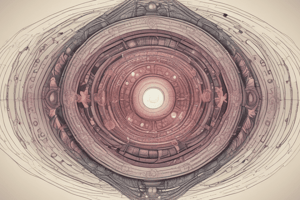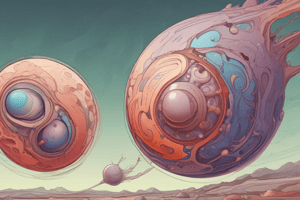Podcast
Questions and Answers
During which stage of embryonic development does the fluid-filled cavity form within the morula?
During which stage of embryonic development does the fluid-filled cavity form within the morula?
- Morula Stage
- Organogenesis Stage
- Blastula Stage (correct)
- Gastrulation Stage
What is the primary function of the trophectoderm (TE) layer?
What is the primary function of the trophectoderm (TE) layer?
- Formation of the embryo
- Formation of the nervous system
- Development of the digestive system
- Development of the placenta (correct)
During which stage do the three primary germ layers emerge?
During which stage do the three primary germ layers emerge?
- Gastrulation Stage (correct)
- Organogenesis Stage
- Morula Stage
- Blastula Stage
What is the main function of the ectoderm layer?
What is the main function of the ectoderm layer?
When does the embryo undergo rapid growth and development?
When does the embryo undergo rapid growth and development?
What is the primary function of the endoderm layer?
What is the primary function of the endoderm layer?
During which stage does the basic body plan and organization of tissues establish?
During which stage does the basic body plan and organization of tissues establish?
When does the development of sensory organs and limbs occur?
When does the development of sensory organs and limbs occur?
What is the main characteristic of the Morula Stage?
What is the main characteristic of the Morula Stage?
Flashcards are hidden until you start studying
Study Notes
Embryonic Development
Morula Stage (Days 3-4)
- A solid ball of cells formed by continuous cell division
- Composed of 16-32 cells
- Cells are compacted and separated by small gaps
- No distinct shape or structure
Blastula Stage (Days 5-6)
- Fluid-filled cavity (blastocoel) forms within the morula
- Cells flatten and spread to form the blastoderm
- Distinct inner cell mass (ICM) and trophectoderm (TE) layers emerge
- ICM will develop into the embryo, while TE will form the placenta
Gastrulation Stage (Days 7-10)
- Complex cellular movements resulting in the formation of three primary germ layers:
- Ectoderm: gives rise to skin, nervous system, and sensory organs
- Mesoderm: forms muscles, bones, and connective tissue
- Endoderm: develops into lining of digestive system and other internal organs
- Gastulation establishes the basic body plan and organization of tissues
Organogenesis Stage (Days 10-8 weeks)
- Germ layers differentiate into specific tissues and organs
- Major organ systems begin to form, including the nervous, circulatory, and digestive systems
- Embryo undergoes rapid growth and development
- Organogenesis sets the stage for further development and refinement of organ systems
Fetal Development Stage (8 weeks-birth)
- Continued growth and refinement of organ systems
- Development of sensory organs and limbs
- Maturation of nervous system and brain function
- Preparation for life outside the womb
Embryonic Development
Morula Stage (Days 3-4)
- A solid ball of cells is formed through continuous cell division, comprising 16-32 cells
- Cells are compacted and separated by small gaps, but have no distinct shape or structure
Blastula Stage (Days 5-6)
- A fluid-filled cavity called the blastocoel forms within the morula
- Cells flatten and spread to form the blastoderm, with distinct inner cell mass (ICM) and trophectoderm (TE) layers emerging
- The ICM will develop into the embryo, while the TE will form the placenta
Gastrulation Stage (Days 7-10)
- Complex cellular movements result in the formation of three primary germ layers
- The three primary germ layers are:
- Ectoderm: gives rise to skin, nervous system, and sensory organs
- Mesoderm: forms muscles, bones, and connective tissue
- Endoderm: develops into the lining of the digestive system and other internal organs
- Gastrulation establishes the basic body plan and organization of tissues
Organogenesis Stage (Days 10-8 weeks)
- Germ layers differentiate into specific tissues and organs
- Major organ systems begin to form, including the nervous, circulatory, and digestive systems
- The embryo undergoes rapid growth and development
- Organogenesis sets the stage for further development and refinement of organ systems
Fetal Development Stage (8 weeks-birth)
- Continued growth and refinement of organ systems
- Development of sensory organs and limbs
- Maturation of nervous system and brain function
- Preparation for life outside the womb
Studying That Suits You
Use AI to generate personalized quizzes and flashcards to suit your learning preferences.




